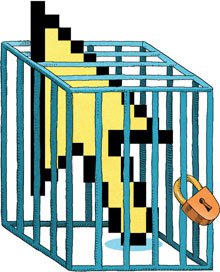Stop Blocking Online Content
Severely limiting Internet access does high school students a disservice.

The blocking problem started back in August 2007. Each time desktop-publishing students tried to access images, they were blocked. When my English teacher, Lisa Huff (profiled in this Edutopia.org article), needed to get to information from Flickr and the document-sharing site Scribd, she was blocked. My classmate Megan Holifield wanted to watch a news clip on YouTube for inspiration in producing her own broadcast, and she was blocked.
Instead of embracing technology as twenty-first-century schools should, the Batesville, Arkansas, schools -- along with many others -- have been turning on the firewalls, preventing students from realizing the full opportunity the Internet offers.
Students and teachers need online tools to create projects, dispense information, and deepen their understanding of the subject matter. After more than a year of imposing a strict blockade, it's high time for the Batesville schools to bulldoze the firewalls and let the light of the Internet shine on students and teachers.
Last fall, a classmate at Batesville High School told me he spent forty minutes trying to access his school-assigned blog, one our English teacher graded regularly. Another classmate said she couldn't get to the images she needed for her desktop-publishing class; she had to download them at home. (Luckily for her, her family owns a computer.)
Not only is this blockade frustrating, it's also hindering our prospects as college- and work-ready students. In a multimedia world, it is essential that students leave high school with a deep knowledge of digital tools. Blogs are not only a cool way to publish your opinions, they are also the future of social and business networking. RSS reader sites like Google Reader enable users to sort and consume massive amounts of information efficiently. The use of photo sites is vital to creating multimedia projects.
District administrators and technicians have been aware of the problem since we voiced our concerns back in September 2007. Last year, I confronted a technician who was remotely accessing my computer about the growing problem of blocked Web sites. He told me that was just too bad -- some things we can't change.
Well, some things we can change. Some things we must change. As of this fall, it seems our district is beginning to grasp the need to equip students with up-to-date technology skills -- our blogs, Flickr, and TeacherTube are now unblocked. But there's still a long way to go.
To be fair, it's not just administrators and technicians who control the Internet at our school. The federal Children's Internet Protection Act states that schools and libraries may not receive the E-rate discount on communications technology unless they have technology protections and an Internet-safety policy. Such policies, according to CIPA, must include measures "to block or filter Internet access to pictures that: (a) are obscene, (b) are child pornography, or (c) are harmful to minors." My blog includes (d) none of the above. Neither does the information Mrs. Huff needed to access, nor does Megan's video.
Of course, the Internet does include some inappropriate material that school technicians need to block. However, blocking educational sites along with the nasty ones is not the solution. Clearly, we need a better, more efficient filter -- one that allows for unhindered educational use while also preventing twelve-year-olds from viewing pornography.
Beyond filters, there lies a fundamental issue of trust. Where is the district's trust in well-meaning, hardworking students when their Internet access is limited to the school home page and CNN?
Think back to when your parents first let you start driving. In the back of their minds was the knowledge that you might ding a door, hit a pole, or even smash into another car. However, they eventually realized they couldn't hold your hand forever; they had to let you drive by yourself. In the same way, districts must loosen the reins and let students "drive" by themselves. And, just as parents teach their teens how to make a left turn on a busy street, schools must mentor students so that they learn to navigate the information superhighway for themselves.
How much longer will schools compromise students' education? To those who have the responsibility to make a change, hear our cry: Tear down that wall.
Credit: Wesley Bedrosian